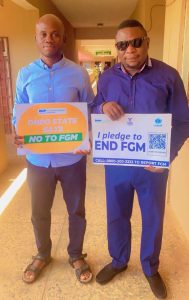STOP FEMALE GENITAL MUTILATION: PROTECT OUR GIRLS
_Oluwadare Adedayo, Akure_
Female Genital Mutilation (FGM) remains one of the most harmful practices still found in parts of South-Western Nigeria, especially in Ondo and Ekiti States where available records from UNICEF show that the practice is still rampant, despite its grave health risks and legal consequences. FGM involves the partial or total removal of the female genital organs for non-medical reasons, and it has been widely condemned as a violation of the rights and dignity of women and girls.
The dangers of FGM are severe. Many women and girls who undergo the practice suffer excruciating pain, excessive bleeding, infections, complications during childbirth, and in some cases, death. Beyond the physical harm, it also leaves lasting emotional and psychological scars. Experts have emphasized that FGM is another form of gender-based violence that must be eradicated.
Sadly, some harmful myths still fuel the practice. In certain communities, there is a belief that girls who are not cut will become promiscuous or that the clitoris harbors bacteria if left intact. These beliefs are false and have no medical or moral basis. The clitoris is a natural, healthy part of the female body, and morality has nothing to do with whether or not a girl undergoes mutilation.
Importantly, FGM is not only dangerous but also a crime. The Violence Against Persons Prohibition (VAPP) Law of 2021 makes it an offense punishable by up to four years in prison. This law reflects the government’s commitment to protecting women and girls and ensuring justice for survivors.
Having recently attended a capacity-building workshop on FGM, I was confronted with a pictorial illustration of how the procedure is done. I must confess, it was deeply disturbing.
That experience challenged me to reflect more deeply on the role each of us must play in bringing an end to this practice. Parents must take responsibility for protecting their daughters, community leaders need to speak boldly against outdated traditions, and the media alongside other relevant stakeholders must use their voices and platforms to correct misconceptions and highlight the dangers. Ending FGM cannot be left to government or NGOs alone. It is a duty we all share.
Protecting our daughters from this harmful act is a collective responsibility. By rejecting FGM, we safeguard the health, dignity, and future of women and girls in our society. Together, we must stop the cut.
